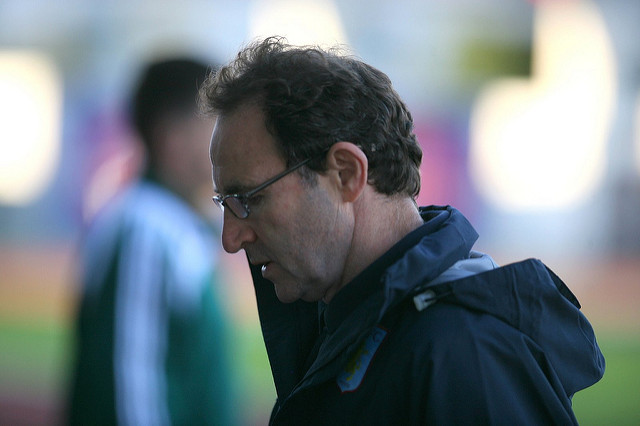 Martin O’Neill (Photo credit: Dagur Brynjólfsson on Flickr, Creative Commons license CC BY-SA 2.0)
Martin O’Neill (Photo credit: Dagur Brynjólfsson on Flickr, Creative Commons license CC BY-SA 2.0)
Attention of late has turned to relationship ruptures between sports figures and organisations and the media whose role is to cover them.
MTK Global’s pugnacious boycott of Irish media along with high profile spats with Joe Schmidt and Jim Gavin, and Martin O’Neill’s utter refusal to address his courtship with Stoke City are certainly worthy of analysis.
Some observers see these rifts as components of an overall trend where traditional media interest and power are in terminal decline.
It is not original to state journalism as we know it is in great difficulty. These recent events testify to the ongoing difficulties.
A changing landscape of content creation and indeed monetisation of content essentially means that from a business and promotional standpoint it makes abundant sense for organisations like the IRFU, MTK Global and the Dublin football brand to decrease engagement with traditional media interests and increase its own direct production of promotional content featuring items that promise higher levels of access and enhanced insight.
This seems eminently achievable while also ensuring a homogenisation of the content and extermination of critical voices while satisfying public interest appetites.
Cast an eye upon the English Premier League. This is a hyper-stylised production often lacking in actual sporting quality amongst its lesser teams and featuring interactions with media-trained players fluent in a large handbook of clichés and gifted in the art of saying nothing.
Yet despite its generalised dullness in terms of its interview content, the EPL remains a corporate and financial juggernaut.
MTK and the IRFU may be worlds apart in terms of the socio-economic background of their sport’s participants but both organisations can cast a look across the southside of the Liffey to Crumlin and analyse a mixed martial arts superstar and a man who ceased all meaningful interaction with the Irish media in 2014.
Conor McGregor broke that silence last year only to promote his hagiographic movie; a move eagerly lapped up by a media utterly devoid of fresh content and enigmatic public personalities, starved of genuine individuals with something interesting to say.
McGregor himself it can be argued has failed to capitalise financially. His online promotional tool ‘The Mac Life’ becomes easily forgettable once the main man isn’t scheduled to fight, while his online training plan is absurdly overpriced.
Yet the key is it’s McGregor who’s in control of his content and he continues to flourish despite negative press from organisations he has long ignored.
A distance between sporting figures and traditional media interest seems inevitable. For now, our rotting-from-the -inside legacy media organisations still retain some pull despite dwindling readership figures.
The comical tension between Martin O’Neill and Tony O’Donoghue for example offer a symbolic physical representation of a growing problem perhaps.
And O’Neill’s blatant disregard for the Irish job while negotiating with a relegation-threatened English team deserves the opprobrium of the press, yet he has remained unanswerable in its aftermath.
It would seem managers like O’Neill and Schmidt and Gavin desire utter submission from media commentators. They operate from the same mindset as Alex Ferguson’s days as Manchester United manager which demanded complete omerta almost. If that submission is not forthcoming, the growing options for private promotion masquerading as information mean the media as we know it faces a permanent side-line.
Of course, being on the side-line is of course is where the media belong. The problem is in the future nobody will be listening to what they say or write about afterwards.
The day is coming when the stars and the audience will no longer need the medium of the press to access information at all.
In fact, that day has already arrived but remains in its early stages. These recent spats may just be a conglomeration of inevitable mini conflicts between competing but similar interests, or they may represent a further example of Irish mainstream media’s ongoing terminal decline as a respectable and more importantly neutral entity.
By Gary Elbert